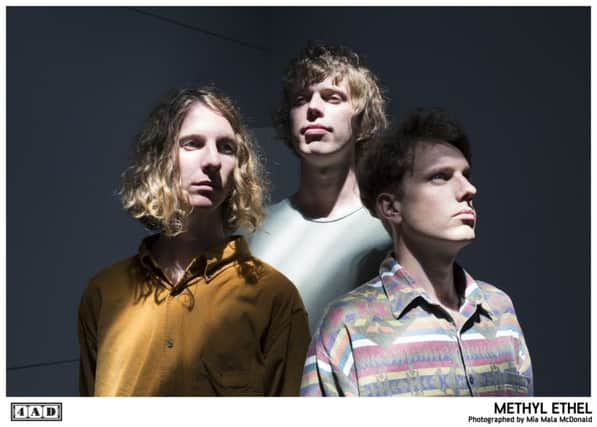Albums round up: Oh Inhuman Spectacle by Methyl Ethel; Just Crazy Enough by SHEL; Out There by Dr Robert; On Dead Waves by On Dead Waves; The Very Best of by Associates


Methyl Ethel are the brainchild of Jake Webb and take their name from the chemical compound his father uses to make fibreglass. Now fleshed out to a trio, they’ve joined the roster of 4AD, the UK indie label who gave us the Cocteau Twins, Pixies and The Birthday Party. It seems the ideal home for off-kilter, otherworldly pop songs such as Idee Foixe, Rogues and Obscura. The Box Tops-go-psychedelic Twilight Driving was named Best Single at the Western Australia Awards. It could well worm its way into quite a few listeners’ affections here.
“Hello, is the doctor in today?” enquire the Holbrook Sisters Sarah, Hannah, Eva and Liza – SHEL – in the opening track of the second album of accomplished indie folk pop. Raised on a Colorado trailer park that their artist mother and professional musician father converted into a farm, they write quirky and richly melodic songs with clear as a bell harmonies that would fit neatly into the schedules of BBC Radio 2. Co-produced and co-managed by Dave Stewart, formerly of 80s synth pop titans Eurthymics, they seem destined for a UK breakthrough with catchy tunes such as Rooftop and Alternate Universe. And if they don’t do it then surely their hushed cover version of Metallica’s Enter Sandman will instead.
Advertisement
Hide AdAdvertisement
Hide AdRobert Howard’s tenth solo album is a decidedly homespun affair. Recorded on an aged eight-track tape machine at his home in Andalucia, southern Spain, Out There strips away the pop-soul ornamentation of his band The Blow Monkeys to reveal a troubadour in the Greenwich Village mould. All The Way Back Home is a bluesy romp while Lost in Rasa is all jazzy open tunings and dreamy, Tim Buckley-like drones. In A Bottomless Pit Howard is joined by fellow ex-pat Jos Hawken on piano and accordion and local busker Joe Delgado on saxophone. There’s a sense of timelessness to these songs. As Howard puts it in Don’t Throw Out Love Away: “Old Samuel Beckett had time on his side/He played the waiting game all of his life/Nothing could shake him from his true belief/He said ‘Time is an illusion we all have to keep’”. Long may Dr Robert remain in practise.
Northampton nu-gazer James Chapman, aka Maps, and melancholy singer-songwriter Polly Scattergood have both made good records over the past decade yet somehow their union – as On Dead Waves – feels less than the sum of its parts. Their gauzy, heavily stylised album attempts to conjure up the spirit of Mazzy Star and David Lynch, laying emphasis on haunting atmospherics, cavernous reverb and barely-there vocals; sadly though their songs aren’t memorable enough. Even a cover of the Johnny Mercer jazz standard Autumn Leaves sounds listless and weary rather than gently bittersweet. Jupiter shimmers attractively but mostly Chapman and Scattergood seem trapped in their own comfort zone.
1976 is best remembered as the year punk rock broke. It was also year keyboard player and guitarist Alan Rankine first saw Billy MacKenzie singing in a “cod funk band” in a Edinburgh club. With a week the pair were writing songs together, united by a fondness for the arty end of glam rock and baroque pop from the 1960s. As Associates they covered David Bowie’s Boys Keep Swinging and Paul and Barry Ryan’s Eloise to winning effect but it was the magnificent self-penned Party Fears Two and Club Country, from their third album Sulk on which their reputation largely rests. Over the top yet sublimely melodic, they showed that synth pop could be wilful, funny and untidily human. Morrissey might have been slyly dismissive of MacKenzie in The Smiths’ song William, It Was Really Nothing but MacKenzie later got his own back in Stephen, You’re Really Something. The latter song comes from a 1993 reunion session with Rankine that was mothballed at the time but is included in an excellent two-disc Very Best Of that unearths rarities such as Jukebox Bucharest and a powerful live rendition of Gloomy Sunday alongside more familiar material such as 18 Carat Love Affair and White Car in Germany. Forty years after the band’s formation and 20 years since MacKenzie tragically took his own life, Associates’ music still burns brightly.